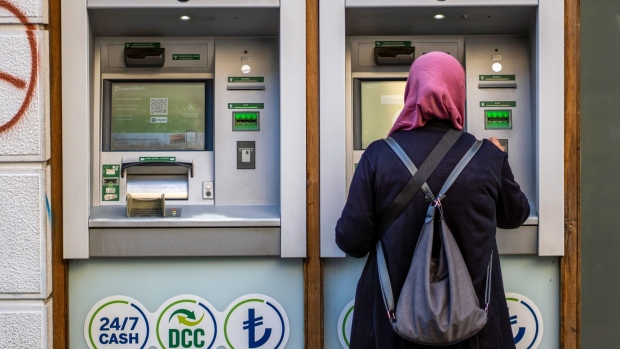May 1, 2024
Turkey Raises Tax on Lira Deposit Interest to Cut Budget Deficit
, Bloomberg News

(Bloomberg) -- Turkey raised the tax on interest income from lira savings to improve state revenues and help narrow a burgeoning budget deficit.
The levy on lira deposits will be increased to 7.5% from 5% for the first six months, falling to 2.5% for accounts held for more than a year, according to a presidential decree published in the official gazette on Wednesday. The so-called withholding tax is directly deducted by financial institutions and paid to the government.
An exemption for withholding tax on foreign-currency protected accounts will be maintained until July. Proceeds from bonds will be taxed between 2.5% to 7.5% depending on how long they have been held, according to the decree.
Turkey’s budget deficit more than doubled in the first quarter compared with a year earlier, partly due to the cost of holding a presidential election last May and dealing with the aftermath of two devastating earthquakes three months earlier. President Recep Tayyip Erdogan’s government is now taking measures to reduce spending and increase revenues to tackle inflation, which rose to almost 70% at the end of March.
Read More: Turkey’s Central Bank Head Vows ‘Whatever It Takes’ on Inflation
“A recent increase in foreign-exchange reserves seems to have encouraged economy management to tax interest income,” Hakan Kara, former central bank chief economist, said on social-media site X.
Turkey introduced a foreign-currency protected deposit program, known as KKM, in December 2021 to help reverse dollarization of deposits and to boost the lira. The KKM was one of the tools used to try and support the currency when it came under pressure from interest-rate cuts in a high inflation environment — a cornerstone of the unorthodox policy pursued by Erdogan in his last term.
Following his reelection last year, a new economy team led by Treasury and Finance Minister Mehmet Simsek has pivoted to a more orthodox monetary policy and set a gradual termination of the program as one of its goals.
©2024 Bloomberg L.P.






